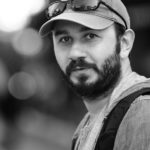(“Voice of Valley”, 2015. Jordan, Leila Jarman)
What inspired you to make this film?
I was taking a sort of broad strokes Middle Eastern history class in my senior year of college and wanted to find a more direct and practical way that I could apply all the philosophy and theory I learned in college. I have always loved film and, more specifically, documentary film and its ability and power to help educate and enact change. I knew we wanted to make a film about women that humanized people in the Middle East to somehow counter the hectic, stereotyped post 9/11 American perceptions of the people from the region. When I finally came across a very short article on a completely unknown blog about Asma and Munira and Radio Al Balad, I knew it was the story I was going to tell.
What do you want American audiences to know about this film or about the subject matter?
I don’t ever like to talk on behalf of a film. Hopefully, audiences will take away what they got from the film and it will speak for itself.
Is it difficult to make films in Jordan? Why or why not?
Looking back, I think my fears and anxieties about this experience were overshadowed by my relentless desire to tell the story. I went to Jordan with nothing but my camera and blind ambition. I had never made a film before and was filled with the excitement of the possibilities that were before me. After arriving and meeting the women, I quickly realized that this film was not going to be shot in one month, mainly because of how challenging to is to make a documentary film about the personal and professional lives of human beings in a foreign country and language with no prior experience. The first month was just initial interviews, some filmed, some not, building trust, finding translators, coordinating vehicles, learning how to use the camera in the field, following the women and understanding their process, etc. It also became clear that these women were not interested in letting cameras into their personal lives, a space that is definitely very private for traditional, tribal Muslim women. Had I made this film in the USA, I know it would have been a much easier experience. In Jordan and in the communities where I was filming, many people had never seen women behind the camera or directing and that was definitely a challenge.
“December 2016”
Disclaimer: Please note that most artists, filmmakers and authors presented by FCI are not native speakers of the English language. To avoid misinterpretation, it is FCI’s policy to print their responses as received without structural or content changes.

